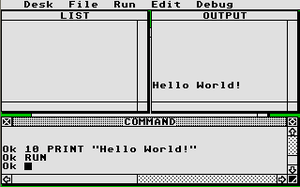Atari ST BASIC
|
Atari ST BASIC (edit-window hidden) | |
| Original author(s) | MetaComCo |
|---|---|
| Initial release | 1985 |
| Type | BASIC |
Atari ST BASIC (or ST Basic) was the first dialect of BASIC that was produced for the Atari ST line of computers. It was bundled with all new STs in the early years of the ST's lifespan, and quickly became the standard BASIC for that platform. However, many users disliked it, and improved dialects of BASIC quickly came out to replace it.
Origins
Atari commissioned MetaComCo to write a version of BASIC that would take advantage of the GEM environment on the Atari ST. This was based on a version already written for Digital Research called DR-Basic, which was bundled with DR's CP/M-86 operating system. The result was called ST BASIC. At the time the ST was launched, ST BASIC was bundled with all new STs.
A further port of the same language called ABasiC ended up being supplied for a time with the Amiga, but Commodore quickly replaced it with the Microsoft-developed AmigaBASIC.
Appearance on screen
The user interface consisted of four windows. An edit-window in which one could enter the source code, a list-window where the entire source code could be browsed, a command/debug-window where instructions were entered that were immediately executed, and the output-window.
However, the windows could only be selected with the mouse, this became cumbersome.
The use of ST BASIC
As it came standard with many early STs for several years, it rapidly became the standard BASIC for the ST. If a computer magazine was to publish some code, or if someone was to distribute a BASIC file, then using ST BASIC would maximise the number of people who could run the program.
However, many people found it inadequate for their needs. Although many people who had just upgraded from an 8-bit home computer found it to be faster than the BASIC for their old computer, and were impressed with the ST's graphical abilities, and the ability to have the program's output display in a different window than the program listing, they soon found that not only did it contain several bugs, but that once other BASICs started to come out on the ST, they realised just how slow ST BASIC was, and that the use of GEM was more of a hindrance once the novelty wore off. The fact that GEM on the ST was limited to four windows and that the ST BASIC interface already used four windows did not help matters.
Bugs
ST BASIC had many bugs. Compute! in September 1987 reported on one flaw that it described as "among the worst BASIC bugs of all time".[1] Typing x = 18.9 resulted in
function not yet done System error #%N, please restart
Similar commands, such as x = 39.8 or x = 4.725, crashed the computer; the magazine described the results of the last command as "as bad a crash as you can get on the ST without seeing the machine rip free from its cables, drag itself to the edge of the desk, and leap into the trash bin". After citing other flaws (such as ? 257 * 257 and ? 257 ^ 2 not being equivalent) the magazine recommended "avoid[ing] ST BASIC for serious programming". Regarding reports that MetaComCo was "one bug away" from releasing a long-delayed update to the language, it jokingly wondered "whether Atari has only one more bug to eliminate from ST BASIC or one more to add".[1]
Alternatives to ST BASIC
The relatively low quality of ST BASIC quickly opened up a market for third-party BASICs on the ST. FaST BASIC and GFA BASIC were two of the first of these third-party BASICs to be released. As these BASICS were not free, a program written in one of these BASICs could only be listed and run if the user had that BASIC. However, compilers and run-time executables started to appear for these BASICs that produced executable code that could run on all STs, and type-in programs became less fashionable, so there was no longer a need for a standard BASIC. By then, HiSoft BASIC, Omikron BASIC and STOS BASIC had appeared. Some of these BASICs even started to be bundled with new STs in the later years.
Books
- Understanding Atari ST BASIC Programming — by Tim Knight, copyright 1986, ISBN 0-89588-344-9
- Atari ST BASIC Quick Reference Guide — by Atari, copyright 1986, revision A. {DDB-G22}
- ST BASIC Sourcebook and Tutorial — by Atari, copyright 1986, Revision B. {DDB-G22}
References
- 1 2 Nelson, Philip I. (September 1987). "One Last Bug". Compute!. p. 74. Retrieved 10 November 2013.
